It became difficult to be ‘really present’ emotionally for the truly powerful scene when Mirai and her mother are reunited… The scene itself depicted a strong conflict within Mirai: between the joy, sorrow, and relief of reuniting with her mother; her mother’s cascade of emotions as well; and the finality of the disappearance of Yuuki.
It really is a powerful scene. I’m also glad how the show stuck to its guns having perhaps overplayed this Yuuki phantasm device in the previous episode. This here is the proper sendoff I believe. However, the show’s manipulations have taken toll on me. I can admit this much. I couldn’t help but have a measure of distrust over what I was seeing. Why distrust? It’s not so much that I don’t believe what I see, but more like an growing unwillingness to believe that what I see is something of creative merit.
Has episode 10 diminished my ability to connect with this show? Is my enjoyment of the experience of Mirai’s character growing compromised by a reasonable preoccupation over the presentation and resolution of a plot point? I must say that at some level, episode 10 (the previous episode) is a failure.
Why? because I answered yes to these questions. I’ve been distracted to a significant degree. I haven’t been allowed to mourn Yuuki at the time I felt so strongly about his potential death. Instead, I spent so much time withholding emotion. I retreated to my thoughts where thinking about the show replaced being moved by the show.
Instead of reflecting on events, I became preoccupied by the narrative conceits and issue of their judicious use. I got sucked in by the considerations of public opinion on the show, which took me away from ‘being’ with the show itself. I got a bit too concerned about whether the show is ‘good,’ weighing arguments and justifications, rather than experiencing the show itself.
These are my choices, and I take responsibility for them. However, they are also consequences of the show’s conceits over the last three episodes. I do think something is lost after all, and that’s a shame. The power of this show is on an emotional level, and anything that takes me away from this diminishes the show.
But I move past this. I grit my teeth through the thick sentimentality that I struggle to find authenticity in, and I think I succeed. I think I found my way back into the emotional wealth of the show, sometime after Yuuki completely disappears.
I know that I truly find myself back, when Mari shows up. When she and Mirai find themselves together again. It comes together… Mari’s loss of her husband comes into play. Her sharing opens up a future for Mirai, a possibility of freedom from the emptiness without Yuuki.
And when Mari herself started crying I let go of all the hangups I had about the creative choices made in the narrative. The gifts to their mother, the ‘really dead montage,’ the overbearing sentimental score, I gave it all up. I am crying.
It’s the first time I’ve done so in a currently airing season, and I consider it a precious gift.
Here’s something to think about:
In the ED montage epilogue, we see the expected images of Tokyo and the characters moving on with their lives: Mirai’s classmates, the mother with the baby stroller that Mari assisted back in episode three, the old couple with the amazing resilience from episode five, Mari’s officemate, the robot otaku on his phone (possibly talking to Mirai <3), Mira’s mom finally getting her round birthday cake a year later, Hana-chan finally getting hers too…
We never see Mari and Mirai together. I think this is a meaningful omission. The epilogue tells a story, and in our narrative, Mirai and Mari don’t form a close relationship over the year of Tokyo’s reconstruction.
This is not to say that they’re not close — nothing could ever take away what they went through together. It just suggests that they aren’t going to be significant parts of each other’s ongoing lives. It’s a rather sad thing for me to consider, but strangely fitting to a certain kind of reasoning that sympathizes to how real relationships play out.
In the end, the story of Tokyo Magnitude 8.0 is a small one, a very intimate one. It was less about Tokyo really, and more about two broken families becoming whole again. The Kusakabe’s brokenness is but a physical seperation and realized a physical reuniting; while the Onosawa’s is a layered one: fractured in spirit, then broken for real, before healing itself.

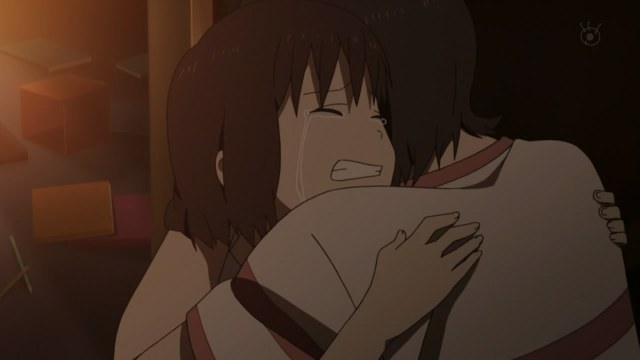
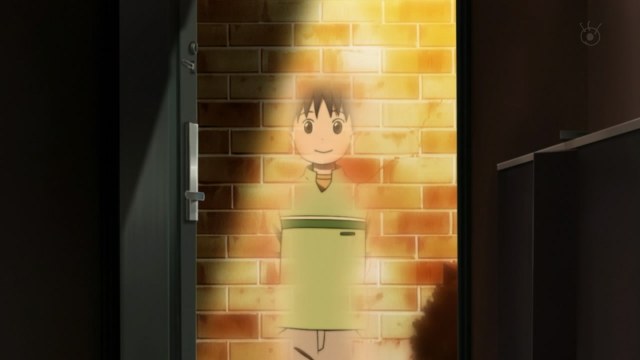
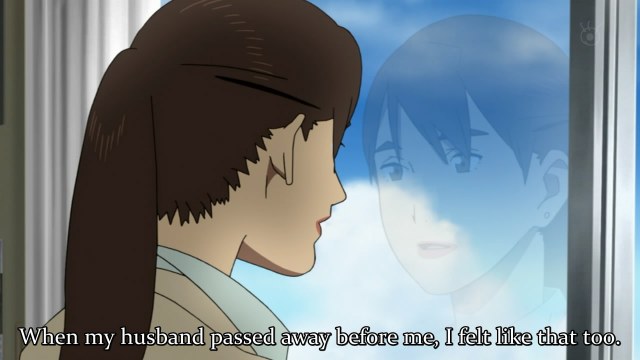

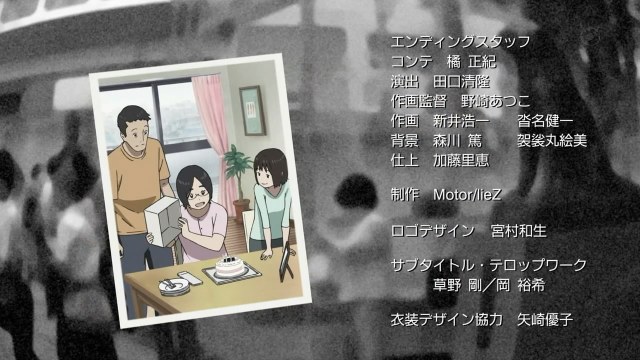
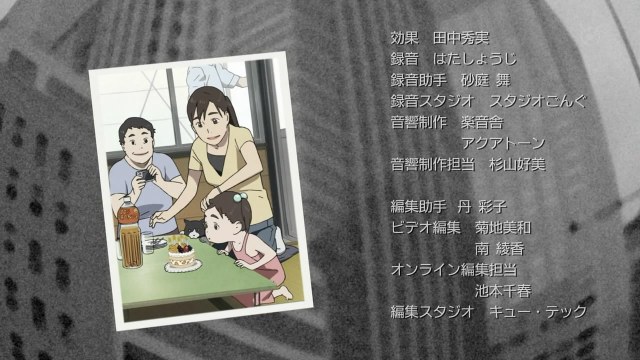



Contrary to disbelief, I didn’t even expect Yuuki to appear at all this episode. However, when I saw him appear while Mirai was walking around endlessly, I felt annoyed. How long are they going to keep this up?
However, after they reach their home, it becomes apparent that Yuuki was going to disappear for good. I took it at face value because I knew they had to do it. What is more impressive is *how* they did it. It was done simultaneously with Mirai’s reunion with her mother, and Yuuki watching over, and disappearing.
All the crying scenes, the crying some more as even more events that remind the family of dead Yuuki. I think that is a very realistic portrayal of a family who has lost something precious. The musical score has outdone itself here. Ootani Kou, who composed from Shana to You’re Under Arrest! goes all-out and it multiplies the powerful impact of the story. I’ll be on the lookout for the OST.
My eyes watered most of the way…but I refused to cry.
A very solid (Yuuki ghost arc is fatally weak though) anime at the end of the day, I consider this the second “current” anime which I truly looked forward to in 2009.
Why did you refuse to cry? I imagine it desirable to do so… my hangups about episode 10 got in the way, and it took some effort on my part as well as the good work that went into episode 11 (including the scenes you mentioned) for me to get past it.
I actually liked this ending (even though a main character died). And I dont say that a lot. I thought the scene with Mirai and her parents crying for/over Yuuki was sad, but when MARI and Mirai cried, I got full on tears going. It really hit home for me. I cant say it was because I lost a sibling like Mirai did (only child, sorry), but I`ve felt like that. Where somewhere in your heart you cant let go to save anything. I did the same when my friends mom and my grandfather who helped raise me when they themselves passed away. It just it home so close that when I watched the rest of the episode, I was honestly amazed at how Mirai recovers from that terrible experience. She is stronger now and will always keep Yuuki in her heart and in her thoughts.
Granted, I would have liked to have seen Mari more in the last 2 episodes, like you said….I mean the story was also about her helping Mirai and Yuuki. Seems like a copout for Mari`s sake. And I do agree that Mirai and Mari have an amazing relationship. Kind of big sister/little sister. In the beginning of the series, I put money down that Mirai and Yuukis parents would have died in the quake and Mari would have to raise them. Well…lost money on that one. /laughs
I kinda hoped that we would see Mirai in the future at the end, reflecting on her life changing experience. Even though that didnt happen, I loved the ending and how it showed everyone getting back on their feet. Thank you Tokyo Magnitude 8.0. You were an amazing ride and I`m happy I chose to get on. 🙂
Though I do wonder: did they ever get Yuuki`s body to have a funeral? (I love how they put robot toys on Yuukis shrine. ROBOT OTAKU EVEN WHEN GONE!) And I was kinda shocked that the time skip was only a month. For all that they put Tokyo back together, it seems like it should have taken place like 6 months afterwards. I dunno. I think that thats a weird thing…
With regards to Yuuki having a funeral, you may want to read this post: http://animewriter.wordpress.com/2009/09/18/death-in-japan-japanese-funeral-customs-practices-and-a-story-of-obligation/
I think your own context of loss gave you a way into an even a stronger emotional connection with the show. I’ve never really experienced anything like this and don’t intend to. That said, this is something I never really thought about: how powerful this show must be for those who actually survived such a disaster.
The people of Kobe come to mind. It’s rather interesting to consider what they make of this show. If there are people who can provide us any feedback re this kind of reception among relevant viewers, I’d appreciate it.
I’m going to mostly agree with X10A_Freedom. Still very respectable series; the ground covered over 11 episodes yields a very full feeling.
Also, too much thinking… in computer terms, it’s like the hard drive, while reaction/instinct is like RAM. ^^
The more I think about it, the less bothered I am about episode 10. Maybe it’s just recency bias [->] but I do think that the show has done enough with the conceit by really seeing it through.
The overthinking part belongs well-after the show ends, like right now. I sympathize with Pontifus’ claim that good literature is masterful at emotional manipulation [http://pontif.us/?p=1074]. I hesitate to call this show as being masterful at it, but it has its moments where it’s hard to argue otherwise.
So, going with reaction/instinct is ideal at enjoying the show in real time.
I too withheld my mourning for Yuuki until after he disappeared from the scene for good. It was hard for me to feel much emotion for the little fellow when the creators kept him prancing around long after most of us knew he was taking the dirt nap. But, I really didn’t mind Yuuki returning to Mirai as she was wandering on the road, to me, that ghost “Yuuki” felt right and true, unlike the delusional/spirit Yuuki from episodes 9 & 10.
From a Japanese/Shinto cultural perspective the ghost Yuuki returning to help his sister reunite with their mother requires very little suspension of disbelief on my part; Japanese legends and lore even up until the 1950’s is loaded with stories of ghosts fulfilling obligations after death that they felt they needed to complete. So, I could understand Yuuki’s ghost helping Mirai keep her promise that they would make it home together, and they did.
Overall, I feel that TM 8.0 was an outstanding series, and it turned out that both Mirai and Yuuki lived up to their names with Mirai being the future and Yuuki giving her the strength and courage to move forward. I also shed loads of man tears when Mirai and Mari finally came together again and Mirai had her emotional catharsis.
While I enjoyed reading your own review of the series, I like what you say here even more. Thanks for the information re lore on ghosts and spirits. It’s very useful I think to contextualize the conceit within a cultural or even narrative tradition.
“This is not to say that they’re not close — nothing could ever take away what they went through together. It just suggests that they aren’t going to be significant parts of each other’s ongoing lives. It’s a rather sad thing for me to consider, but strangely fitting to a certain kind of reasoning that sympathizes to how real relationships play out.”
This resonates with me, because it’s true.
The mention of a “Really Dead Montage” made me laugh out loud, though. It seems so ridiculous when it’s boiled down that way.
Funny trope is funny.
I’ve had a number of relationships that never went further after surviving tough and intense experiences as comrades. I imagine that we will never have much to talk about as individuals, but a level of trust and gratitude never leaves… I’d give any of those people my time should they ask for it, and I imagine they’d do the same for me.
Otherwise, there’s really no compelling reason to socialize.
So we’ve finally come to the end? Good. Not that I didn’t enjoy the ride for the most part, but I feel a satiating completeness. The final episode was definitely one of the tougher ones for me to get through. And I didn’t notice something until the end credits had completed.
What I noticed was that while episode 11 was going on, at least once Mirai & her mother reunited, I didn’t care or remember my complaints from the previous episodes. I had pushed aside my feelings about Yuuki’s circumstances. Mirai’s “spoiled brat”/”bitchy” attitude was lost on me. So were the sometimes desperate and callous acts of the people who Mirai, Yuuki (*sniffle*) and Mari had encountered. I barely even thought about the good moments the 3 of them shared on their trip. I was just happy that they had made it home, one way or another. I think because of that, I consider this series a success. It got me emotionally attached & invested in the characters.
Now when it comes to scoring this series, I wish I could give half scores. Because it was just a 6.5 to me. But I gave it a 7 for an engrossing beginning, the emotional gems spread throughout the middle and a very good ending episode.
I won’t comment on your scoring, as I find myself rather terrible at MAL’s scoring system. Half the time I don’t trust my own ratings and for this reason I don’t review media. What I can say, is that this show is interesting. It’s a great deal interesting, for some of the reasons you mentioned. I too became very involved with the characters. I feel that there things I want to say about them and the show, and to me this is a successful investment of my time.
I think you’ve mentioned one point I was kind of disappointed with TM 8.0’s ending, and that was how Mari-san and Mirai relation concluded in the series. It was rather sad that both Yuuki and Mirai have been mentioning during the journey that they should have still known and shared their lives with Mari-san even not just for the earthquake.
I don’t know, maybe the reason for the “parting” they did was for not to open again the wound Yuuki’s death made during their experience. But, I also agree that whatever may happen in the future, I doubt Mari-san and Mirai would ever forget what happened during that short experience the “three” of them had altogether.
Aww, just how I wish I at least saw one photo of Mirai and Mari-san together from those photos 😦 . I guess all must move forward… I’m so sad its one of the things they left behind.
It could be for any number of reasons. I can really say I’ve had people in my life that aren’t part of it much save for the memory of a short but very intense period. I certainly won’t forget them, should I see them again, but no there’s nothing really to keep us interested in each others’ lives.
It was a good final episode to an otherwise good show (compared to the atrocities of this season (read: Princess Lover —> )
I really didn’t cry much if any at all … tears are usually reversed for very very long shows that are about to end … though the Yuuki baby to present picture slide-show with the great music in the background was really really pushing me oh so close.
Looking back at the whole phantasm / hallucination arc or whatever you want to call it, I really am quite disappointed I seemed to have been forced by the show into accepting cultural/Japanese beliefs into the afterlife and spirits/ghost … however you want to spin it. Seems like one of the comments above caught onto to it …
I was going along for the ride thinking it was some sort of … you know … mental barrier (Yuuki as a spirit) to keep herself (Mirai) from going insane … something rooted into … real life trauma/PTSD (post traumatic stress disorder) … something tangible and ……. explainable (can actually point it to to real life previous case scenarios) at least instead of …. hey … that’s their (Japanese/eastern) beliefs and they are going along with it ….
TLDR: Psychoanalysis ==> Yuuki was a hallucination to keep her sane. Japanese/Eastern View = He’s a spirit guiding Mirai to her goal.
Nothing wrong with the former … but then again .. kinda is when you have a huge ass disclaimer on realism every episode … kinda want to stray away from the “higher thinking” concepts now =) =) =)
Well I hope that made a lick of sense and my fractured sentences since I’m typing this and watching Valkyria Chronicle 24 at my peripheral vision at the same time =)
Final Note … what to watch next season …… <.<
Hmmm. Here’s some things you may want to consider:
1. A show can’t force you into anything. It’s passive media. It can’t put a gun against my temple and force me to change my religion, become an otaku, change my sexuality, etc etc.
2. More importantly, neither of us are members of the intended audience of the show. The show was made by Japanese for Japanese viewers. It’s not even otaku-centric, as there’s really no fanservice in the show: no fighting, no testosterone-fueled heroism, no bishounen, no panties, etc. It makes perfect sense to me that the cultural beliefs that are both accessible and acceptable to its audience are used.
3. PSTD (Post-Traumatic Stress Disorder) is realistic, it exists, is a clinical term, etc. Various ‘realistic’ films and tv shows by American makers have featured it for decades. The depiction of the hallucination is consistent to many of these. The assertion that Yuuki the phantasm appeared to ‘keep Mirai sane’ is speculation by viewers.
Animewriter above should be a good resource for #3. He’s served as a soldier and has first-hand accounts of fellow servicemen experiencing it.
1. No the show didn’t force me into anything, I accepted the fact they are — relying — on Japanese cultural/Shinto perspective to explain Yuuki and less on a clinical condition. I simply rode with it and took it for what it is, hell it made for the “happier” version anyways, and I do love my “happy” ending. It wasn’t like I felt the show was ever beating down on me with heavy religious/Japanese teachings on the afterlife.
2. I had some huge ass essay for this one but I just deleted it. You’re fucking right. Whatever I wrote just came back to prove your point. I had to Google it and it came out be like 84%-96% adhere to Shinto/Buddhism.
I was going to argue that some people would find some sort of fallacy with a show claiming “realism” and using “religion” to explain Yuuki, but nope, when you have an upper 96% of the Japanese population practicing, I guess you can’t argue some of them would question the show using a “non-scientific” reasoning. As you said … I’m not the intended audience. I can’t argue against someone’s religion when they perceive their beliefs to be their reality. Tokyo Magnitude 8.0’s “reality” … it’s “Striving for — realism –” tag line … encompasses Shinto/Buddhist beliefs. I can’t argue otherwise outside of offending or challenging another person’s religion which I don’t feel like doing on your blog =)
3. I have no idea what you’re trying to argue here o_O. I wouldn’t have known if this was other people’s view points, I only read your blog for Tokyo Mag commentary.
No argument, just something I offer for your consideration ^_^
Re #3 I got the impression that you were implying that the show was not consistent with the disclaimers it made regarding its attempts at realism. A claim that says “Yuuki appeared to Mirai to keep her sane” is an interpretation. A valid one, but resides completely within the subjective experience of a viewer.
What I think is that Yuuki’s ‘ghost’ is a phantasm that is consistent with PSTD. While I’m no expert on this, I think it works this way. Now, as a phantasm, the form assumed is one that is consistent with accepted spiritual beliefs. I hope I explained it clearly LOL.
But if you hadn’t been told about the signs of Yuuki’s death in the aniblogosphere, and would watch the series ‘normally’ — with that I mean like the creators intended the viewer to see it — episode 10 would be a real emotional shock for you, and you wouldn’t even think of mourning Yuuki before it. I myself don’t find that episode a failure, just not as good as the rest.
As for this episode, I think they exaggerated the family-in-the-hospital-crying scene to the point where I couldn’t hold a smile. I don’t know exactly why, but I think perhaps too much teariness is too much teariness. The true story climax was the reunion of Mirai and her mother — here I truly lost a teardrop or two.
Good anime, I’d say.
It assumes that I’d totally miss the signs. I may miss the signs in episode 7, but by episode 8 they are already blatant, if unconfirmed.
Now that it’s over, I’m not so sure what I thought of this show at all. Before the season began I was pretty excited about this show and how it would handle a large earthquake. I understand them needing to create some characters that the audience would care about in order to ‘humanize’ the story. But really I couldn’t relate to the characters at all.
The show starts off with a whiny girl, who becomes less whiny and then is just crying a lot by the end. Overall this show was a disappointment as they could have done so many other things with it which they never did.
The inability to relate is fatal to the appreciation and enjoyment of a show like this I think. I don’t share your disappointment at all, but I understand your inclination to believe so.
Yeah. I did notice that it was very easy to take yourself out of the emotional impact of TM8.0 when you start thinking about it too hard with others, or you wait for some emotional catharsis on your part, but not on the character’s part. What’s more important: how the show’s supposed to make you feel? What you wanted to feel? Other stuff? Selfishness?
I suppose it depends. I’d be lying if I said I had a game plan at the beginning of a series, much less a new one. At some point you make a call. One thing that’s notable here is how striking the conceit in the middle is, that it did throw us into a tizzy.
This may be too late, but…
Despite what anyone says, I will remember this show for the experience I had as a viewer than what the show had offered. It was emotional at times, and it’s rare to have some shows make me feel that way.
And I felt that everything went as planned in the end – Mirai gets her turn-around as a character, the Onosawa family is more or less better than how they started, and that was what I was expecting. True that I had a crazy theory of the Onosawa parents ending up dead, but really, I wanted everyone to live. I had my own objections ever since the “Yuuki is dead” card started to play, but in the end, I accepted it for what it is.
And most importantly, I will always remember this show for St Yuuki. He will continue to live in my heart as the patron saint of robots. I am asking for his intercession that 2010 will have a lot of robots. Amen.
Never too late for prayers to St. Yuuki here man!
I too, accept the show for everything that it did, and for everything it did not.
This was one of the stronger shows I’ve watched in terms of emotional moments that both the lead characters and side characters went through. For example, the old man and his wife, whose grandchildren passed away. There were so many points in this that set off emotional responses in me. I’m not saying I cried for any of these moments (although the end of this hit me pretty hard), but this series pulled off what it was trying to do very well, and that was show the true nature of a disaster.
Pingback: Tokyo Magnitude 11 – The Tears of Moving On (END) « Anime Fascination
Pingback: Moments of 2009: Did He or Didn’t He? (Tokyo Magnitude 8.0) « We Remember Love